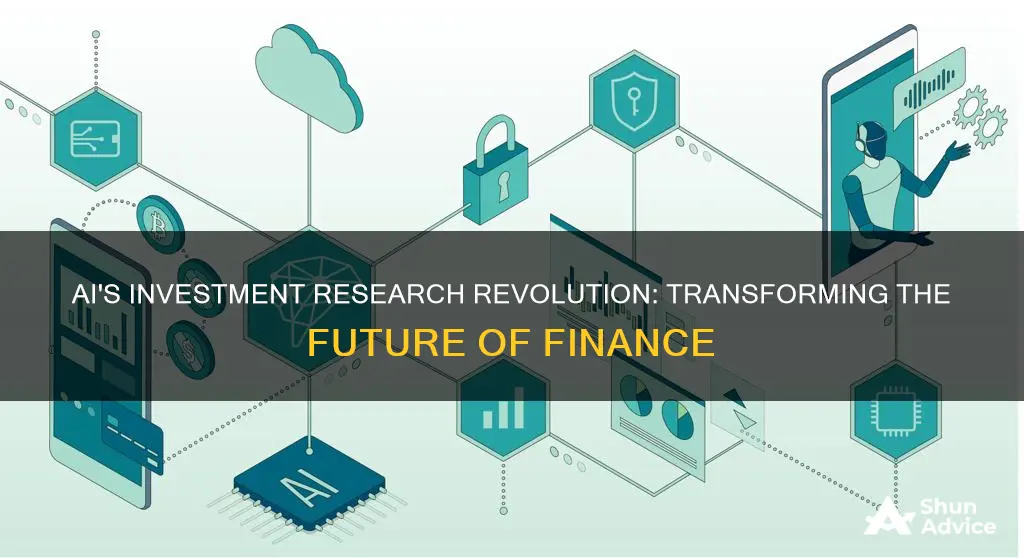
Artificial intelligence (AI) is set to transform investment research and the wider investment landscape in a multitude of ways. AI tools can process data quickly, enhancing forecasting, decision-making, and idea generation for investment analysts and portfolio managers. AI can also reduce human error and bias, and save time by interpreting large volumes of data from multiple sources. This includes financial statements, news articles, social media data, and more.
AI is particularly useful for investment research due to its natural language processing (NLP) and natural language generation (NLG) capabilities, which enable it to understand, interpret, and generate human language. This allows AI to generate reports and uncover insights that would otherwise be difficult for humans to identify.
The application of AI in investment research is expected to lead to improved operational efficiency, enhanced product and content distribution, and better risk management. AI can also assist in generating alpha, or outperformance, by adopting alternative data sets.
While AI brings numerous benefits, there are also potential risks and challenges, such as ethical concerns and the need for careful implementation and talent management.
| Characteristics | Values |
|---|---|
| Speed | AI tools can process data and generate insights faster than humans |
| Data processing | AI can handle large-scale data processing and integrate various data sources |
| Decision-making | AI can optimise risk-return levels and make investment decisions |
| Forecasting | AI can identify trends and make predictions |
| Idea generation | AI can suggest new investment ideas and strategies |
| Cost reduction | AI can reduce costs by improving operational efficiency and automating tasks |
| Regulatory compliance | AI can bolster compliance functions |
| Risk management | AI can help identify and manage risks |
| Customer experience | AI can improve customer experience by providing more insights and customised content |
| Competitive advantage | AI can be a source of competitive advantage for firms |
What You'll Learn

AI's ability to process large volumes of data quickly
One of the key advantages of AI in investment research is its speed and efficiency in processing large-scale data. AI can analyse and interpret unstructured data sources, such as natural language in the form of earnings call transcripts, press releases, investor presentations, blogs, and news articles. Natural Language Processing (NLP) and Natural Language Generation (NLG) are machine learning branches that enable computers to understand and generate human language. NLP processes natural language by converting text into structured data, while NLG interprets and analyses structured data and presents it in a readable format. This enables AI tools to generate reports and uncover hidden signals in the data, enhancing investment decision-making.
AI can also integrate traditional data sources with new ones, such as web traffic, web search trends, and social media data. This integration provides a more comprehensive view of market trends and helps identify potential investment opportunities. For example, sentiment analysis of social media data can provide valuable insights into public perception and potential trends.
The use of AI in investment research is not limited to data processing and analysis. AI can also optimise portfolios by creating unique optimisation strategies that are tailored to the manager's style and investment philosophy. It can also assist in risk management by identifying liquidity patterns and forecasting liquidity demands, helping market makers optimise their pricing strategies.
In conclusion, AI's ability to process large volumes of data quickly is revolutionising investment research by enhancing data analysis, improving forecasting, optimising portfolios, and identifying potential investment opportunities. As AI continues to evolve and advance, it will likely play an even more significant role in shaping the future of investment research and decision-making.
Solar's Dark Side: The Shady Truth About Investing in Sunshine
You may want to see also

AI's role in supporting research and data gathering
AI has the potential to revolutionise the investment research process, and its role in supporting research and data gathering is significant.
AI tools can process vast amounts of data from various sources, including financial statements, news articles, social media, and web search trends, enhancing analysts' forecasting and decision-making abilities. This large-scale data processing enables portfolio managers to uncover hidden trends and make more informed investment choices.
Natural Language Processing (NLP) and Natural Language Generation (NLG) are key to this process. NLP interprets and structures data from various sources, while NLG converts structured data into readable formats, generating machine-produced reports that provide insights and improve forecasting.
AI can also be used to generate investment ideas, reducing the time spent on initial research. It can interpret management sentiment during earnings calls, analyse sell-side reports, and sift through unstructured data sources to identify trends. This enables portfolio managers to make real-time adjustments and optimise their portfolios based on AI insights.
In the short term, generative AI is expected to play a supporting role in research and data gathering, with human oversight needed to discern false positives from actual data. However, in the long run, AI has the potential to shape the investment management industry by providing unique insights and improving efficiency.
The Retirement Investment Conundrum: Listed or Unlisted?
You may want to see also

AI's impact on the investment decision-making process
AI's ability to process and interpret vast amounts of data from multiple sources quickly and efficiently is transforming the investment decision-making process. AI tools enhance analysts' forecasting and decision-making by integrating traditional data sources with new ones, such as web traffic, search trends, and social media data. This enables portfolio managers to uncover hidden trends and make more informed investment choices.
One of the most significant advantages of AI in investment decision-making is its ability to reduce human bias and error. By using Natural Language Processing (NLP) and sentiment analysis, AI can interpret management sentiment, gauge analysts' projections, and identify potential investment ideas by analysing unstructured data sources. This helps in making more objective and data-driven investment decisions.
AI also plays a crucial role in optimising risk-return levels and researching potential investment methodologies. It can handle a vast number of inputs and parameters quickly, allowing for more comprehensive analysis and strategic planning. Additionally, AI's ability to learn from its mistakes and adapt to new information further enhances its decision-making capabilities.
While AI provides significant benefits, there are also considerations and challenges to be addressed. One key challenge is distinguishing false positives from actual data, which can introduce additional risk. Ethical concerns, data privacy, and regulatory acceptance are other important factors that need to be carefully navigated.
In conclusion, AI is already having a profound impact on the investment decision-making process, and its influence is expected to grow in the coming years. With the right safeguards and ethical frameworks in place, AI has the potential to revolutionise the way portfolio managers work, leading to increased efficiency, better decision-making, and higher returns.
Should You Invest in GE Now?
You may want to see also

AI's influence on the trading process
Firstly, AI can support existing research and data gathering processes by processing large volumes of data from various sources, including financial statements, earnings call transcripts, news articles, and social media data. This enables portfolio managers to identify trends, generate ideas, and make more informed investment decisions. AI tools enhance forecasting and decision-making by integrating traditional and new data sources, contributing to improved performance.
Secondly, AI influences the trading process by optimising risk-return levels and researching potential investment methodologies. AI is not subject to human emotions, a common enemy of traders, and can make rational decisions based on billions of inputs and parameters. It can handle various tasks, from idea generation to back-testing performance and disaster planning.
Thirdly, AI can assist in market-making by automatically determining market conditions and identifying liquidity across global trading venues, leading to improved efficiencies. Market makers can utilise AI to accurately forecast liquidity demands and optimise pricing, reducing spreads and costs.
Lastly, AI enhances operational efficiency by automating tasks and transforming traditional cost centres into "as-a-service" offerings. It improves customer experience by enabling advisors to generate insights, customise content, and deliver it to clients faster.
Overall, AI's influence on the trading process is expected to lead to cost savings, improved efficiencies, and better decision-making, ultimately delivering higher alpha. However, organisations must carefully navigate potential risks, ethical considerations, and the intersection of technology and talent to fully benefit from AI in the trading process.
Measuring Investment: People Over Profits
You may want to see also

AI's potential to transform the operating environment for investment management firms
Artificial intelligence (AI) has the potential to transform the operating environment for investment management firms in several ways. Firstly, AI tools can process vast amounts of data from various sources, including financial statements, news articles, social media, and web search trends, enabling faster and more informed decision-making. This large-scale data processing capability enhances forecasting, investment decision-making, and idea generation for portfolio managers and analysts.
Secondly, AI can improve operational efficiency by automating tasks and transforming traditional cost centres into "as-a-service" offerings. This not only reduces costs but also allows investment firms to focus on developing new propositions and delivering new kinds of value. For example, AI can be used to generate investment ideas, reducing the time spent on initial research.
Thirdly, AI enhances product and content distribution by enabling advisors to generate more insights, customise content, and deliver it to clients faster and more efficiently. AI can also optimise risk-return levels, research investment methodologies, and handle tasks such as buying investments and placing them in client accounts.
Lastly, AI is a game-changer for risk management. It enables firms to strengthen compliance, automate data analysis, and better manage ambiguous events. By integrating AI, firms can identify and manage risks more effectively, thereby improving their overall risk management capabilities.
While AI offers significant opportunities for investment management firms, it is essential to carefully consider the potential risks and challenges, such as data privacy, ethical concerns, and bias in data sets. Additionally, organisations should explore the intersection of technology and talent to fully benefit from AI's potential and drive transformation in their operating environment.
Florida Teacher Retirement Plans: Unlocking the Pension Investment Puzzle
You may want to see also
Frequently asked questions
AI tools can process data quickly, enhancing forecasting, decision-making, and idea generation. AI can also save time and money by reducing the need for human labour and improving efficiency.
AI can be used to process and interpret large volumes of data from various sources, including financial statements, news articles, and social media. It can also be used to generate reports, make predictions, and identify trends and potential investment opportunities.
One of the risks of using AI in investment research is the potential for bias and ethical issues arising from the data sets used. Additionally, there may be challenges in implementing AI due to the need for clear objectives and strategic evaluation.
AI has been used to develop customised investment solutions for consumers, optimise portfolio allocation, and improve risk management. It has also been used to automate various tasks such as buying investments, sending statements, and generating tax reports.







